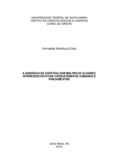| dc.contributor.advisor | Mota, Luiza Rosso | |
| dc.creator | Diaz, Fernando Bortoluzzi | |
| dc.date.accessioned | 2017-04-26T05:33:10Z | |
| dc.date.available | 2017-04-26T05:33:10Z | |
| dc.date.issued | 2016-12-16 | |
| dc.date.submitted | 2016 | |
| dc.identifier.uri | http://repositorio.ufsm.br/handle/1/2799 | |
| dc.description | Trabalho de conclusão de curso (graduação) - Universidade Federal de Santa Maria, Centro de Ciências Sociais e Humanas, Curso de Direito, RS, 2016. | por |
| dc.description.abstract | In February 2015, with more than twenty years of delay, the National Council of Justice launched the project "Custody Hearings" with the objective of actualize the American Convention on Human Rights and the International Pact on Civil and Political Rights with regard on the rapid presentation of the arrested in flagrante to the judicial authority. This new procedure aims at adjusting criminal procedure to international standards, preventing police torture, avoiding arbitrary arrests and fighting overburdening of jails. In the course of the work, it was possible to identify, among the main state institutions linked to the execution of the audiences, which ones were favorably positioned and which were positioned against their realization. The Magistrate, the Police and part of the Public Prosecution were contrary, while the Public Defender and an expressive portion of the Public Prosecutor's Office were favorable. This way, considering the reflection that this processing system has on the human and fundamental rights prisoner arrested in flagrante, the presented monograph has the goal to verify if the interests of these institutions overlap with the applicability of custody hearings, as well as the as if they guarantee the Human and fundamental rights of prisoners arrested in flagrante. For that, the inductive approach method and the functionalist procedure method were used. The research techniques employed were bibliographical and documentary. Finally, based on a guarantor view and on the theory of fundamental human rights, it was possible to conclude that opposed interests to the custody hearing reflect in the softening and lack of protection of the fundamental human rights of the flagranteated and should be rejected. | eng |
| dc.language | por | por |
| dc.publisher | Universidade Federal de Santa Maria | por |
| dc.rights | Acesso Aberto | por |
| dc.subject | Audiências de custódia | por |
| dc.subject | Direitos humanos e fundamentais | por |
| dc.subject | Presos em flagrante | por |
| dc.subject | Interesses estatais | por |
| dc.subject | Custody hearings | eng |
| dc.subject | Human rights and fundamental rights | eng |
| dc.subject | Arrested in flagrant | eng |
| dc.subject | State interests | eng |
| dc.title | A audiência de custódia sob múltiplos olhares: interesses estatais versus direitos humanos e fundamentais | por |
| dc.title.alternative | The custody hearing under multiple perspectives: state interests versus fundamental and human rights | eng |
| dc.type | Trabalho de Conclusão de Curso de Graduação | por |
| dc.degree.local | Santa Maria, RS, Brasil | por |
| dc.degree.graduation | Curso de Direito | por |
| dc.description.resumo | Em fevereiro de 2015, com mais de vinte anos de atraso, o Conselho Nacional de Justiça lançou o projeto “Audiências de Custódia” visando dar efetividade à Convenção Americana de Direitos Humanos e ao Pacto Internacional de Direitos Civis e Políticos, no tocante à rápida apresentação do preso em flagrante à autoridade judicial. Este novo procedimento almeja ajustar o processo penal às normas internacionais, prevenir a tortura policial, evitar prisões arbitrárias e combater o superencarceramento. No decorrer do trabalho foi possível identificar, dentre as principais instituições estatais ligadas à execução das audiências, quais se posicionavam favoravelmente e quais se posicionavam de modo contrário à sua realização. Foi identificado que a Magistratura, a Polícia e parte do Ministério Público eram contrários, enquanto a Defensoria Pública e expressiva parcela do Ministério Público eram favoráveis. Assim, considerando o reflexo que tal sistemática processual possui sobre os direitos humanos e fundamentais do preso em flagrante, a presente monografia teve como objetivo verificar se os interesses dessas instituições se sobrepõem à aplicabilidade das audiências de custódia, bem como se mitigam a garantia dos direitos humanos e fundamentais dos presos em flagrante. Para tanto, foi utilizado o método de abordagem indutivo e o método de procedimento funcionalista. As técnicas de pesquisa empregadas foram a bibliográfica e a documental. Por fim, partindo-se de uma visão garantista e da teoria dos direitos humanos fundamentais, foi possível concluir que os interesses opoentes à audiência de custódia refletem no abrandamento e na desproteção dos direitos humanos fundamentais dos flagranteados, devendo ser rechaçados. | por |
| dc.publisher.unidade | Centro de Ciências Sociais e Humanas | por |


